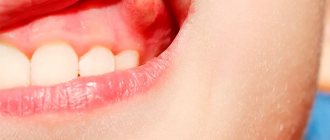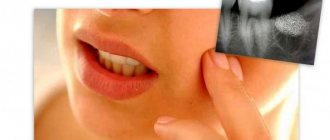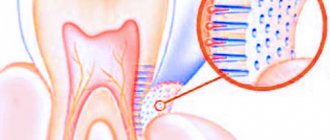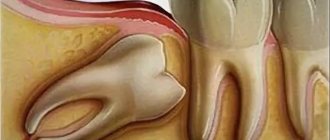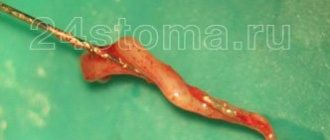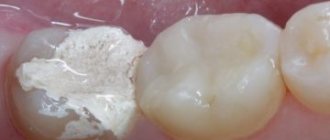Causes of toothache
Toothache occurs for various reasons. Depending on what is caused, it can be aching or acute, constant or appearing when exposed to hot and cold food. It can occur when the enamel is damaged or due to inflammatory processes. Before eliminating pain, you need to find out what causes it.
Caries
The most common cause of pain is caries. At the initial stage it does not cause any problems. But if you do not start treating superficial caries, it will spread deeper. This affects the pulp and thins the enamel. Therefore, toothache occurs. At first it is not strong, but over time it becomes more painful.
Painful sensations during caries can appear when brushing teeth, exposure to cold or hot food. Gradually the pain occurs more often. Its peculiarity is that it disappears after the cessation of exposure to external factors or after rinsing the mouth. If caries is not cured, various complications develop, the most common of which is pulpitis.
Pulpitis
This is the name for inflammation of the soft tissues of the tooth in which the nerve is located. Therefore, such pain is more painful, it is acute, often spreading to the temple, ear, and throat. It can also occur when exposed to external factors. But pulpitis often manifests itself as aching pain at night.
They can also be shooting, burning, pulsating. From time to time the pain subsides, but then resumes again. Therefore, you should definitely go to the doctor at the first signs of pulpitis.
Flux
If a purulent infection penetrates the root of the tooth, periostitis develops. This pathology is better known as flux. It is characterized by painful compaction and swelling of the gums, often spreading to half the face.
Increased tooth sensitivity
A common cause of pain is increased sensitivity of tooth enamel. If it is thin, there are cracks or chips on it, the tooth will hurt when exposed to cold, sour and sweet, when brushing.
Inflammatory diseases
If inflammatory processes occur in the oral cavity, pain may occur. It appears due to swelling of soft tissues that compress the nerve endings. This happens with periodontitis, periodontitis. Painful sensations in these pathologies are characterized by a diffuse nature and intensification with pressure.
After removal
After a tooth is removed, pain is sure to occur. It may last for several days, this is normal. Usually it is aching, constant, or appears due to mechanical impact.
Due to improper treatment
Part of the cause of toothache is an incorrectly applied filling. If microorganisms get under it or there are cracks in it, a purulent process develops. The same thing can happen if a bridge is installed. In these cases, urgent treatment is necessary, otherwise you may lose the tooth.
Wisdom teeth
The growth of wisdom teeth causes many problems. Often this process is accompanied by severe pain. After all, they have to break through the gums. Pain occurs even if wisdom teeth grow correctly. But it happens that this process is disrupted. Then they can damage neighboring teeth. And the painful sensations from gum inflammation are accompanied by caries or pulpitis.
Dental injuries
Mechanical impact, frequent consumption of solid foods, opening corks with teeth, or using them to crack nuts can cause damage to the enamel. It becomes thinner, cracks appear on it, and a piece may break off. Sometimes a piece of the tooth also breaks off. This exposes the nerve and causes severe pain. This situation is possible with jaw injuries.
Dental treatment under general anesthesia
General anesthesia (anesthesia) is rarely used in dental practice. Conventional tooth freezing is most often used. General anesthesia is used only if serious dental work is to be done. The effect of anesthesia lasts approximately 6 hours, during which time the patient remains unconscious.
Using general anesthesia for pain relief in dental treatment has some advantages:
- Tooth extractions or other procedures can be done in one go. There is no need to return to the dentist for further treatment;
- Dental treatment under general anesthesia is absolutely painless. In addition, the chance of any infection getting into the wound is reduced;
- When treating teeth under general anesthesia, substances that block the formation of saliva are used.
We suggest you familiarize yourself with a maxillary sinus cyst, one of the causes of a runny nose.
However, the use of anesthesia has many contraindications: mental instability of the patient, intolerance to anesthetics, allergic reactions. Therefore, the main method of pain relief during dental treatment in dentistry is local anesthesia.
Toothache during pregnancy
Women are recommended to have all their teeth treated at the planning stage of pregnancy. After all, at this time you cannot take most medications, and filling with pain relief is also undesirable. But even in this case, a pregnant woman may have such a problem. Hormonal imbalances and lack of minerals lead to increased sensitivity of the enamel and the rapid development of caries.
If you have a toothache during pregnancy, you should urgently go to the dentist. The best way to relieve pain is by rinsing and applying soda or sea salt. Herbal decoctions should be used with caution, as allergic reactions are more common during pregnancy.
Among the medications for pain relief, Paracetamol or Nurofen are allowed in small doses. As a last resort, you can drink Analgin. But any pills are contraindicated in the early and late stages. Moreover, they are very weak and cannot be taken often. Therefore, it is best to have regular dental check-ups. This will help avoid situations where severe pain occurs.
What should I do to make the anesthesia wear off?
The anesthesia will go away faster if you do a massage.
In order to avoid undesirable consequences, you should ask your doctor in advance how to remove the frost after dental treatment.
The specialist should explain that in order for the painkiller to wear off as quickly as possible, you need to follow a few simple rules:
- A few hours before visiting the dentist, it is not recommended to eat heavy food or drink alcohol. Do not take any medicines unless they have been prescribed to you by your doctor.
- In order for the frost to go away faster after a simple dental procedure, it is recommended to drink something warm, as well as massage the numb area.
- After a serious intervention (pulp opening, drainage, etc.), you should not drink or touch this area. Stop drinking for an hour after the intervention, and do not eat food for four to five hours.
After dental treatment, you should not drink for several hours.
If the effect of the painkiller does not go away for a long time, then you need to visit a doctor as soon as possible. It is possible that a nerve was damaged during the intervention. In this case, physical therapy is performed, and a consultation with a neurologist may be required.
How to get rid of toothache
There are many ways to get rid of toothache. But all of them should be used only as a means of first aid. They can reduce pain or even completely remove it. But the cause of the problem will not be eliminated. Only dental treatment can completely relieve suffering and prevent complications.
Medicines for toothache
The fastest and most effective method of toothache pain relief
- This is taking medication. But you should not self-medicate; you need to take the medications prescribed by the doctor. Many tablets irritate the gastrointestinal tract and may cause other side effects. In any case, even if there are no contraindications to taking the medicine, it should not be taken for more than 3 days. This is a method that should be used in emergency cases, the tablets will help relieve suffering before visiting a doctor.
Most effective for toothache
such drugs:
- all drugs based on ketoprofen - “Ketorolac”, “Ketanov”, “Ketorol”;
- “Ibuprofen” and other products based on it – “Mig”, “Nurofen”, “Faspik”;
- "Nimesulide", "Nise";
- "Indomethacin".
Such popular painkillers as Analgin, Aspirin and Paracetamol for toothache
They don't help much. To enhance the effect of Analgin, you can crush it and put it on the sore tooth, covering it with cotton wool.
Folk remedies for toothache
You can soothe the pain for a short time with the help of folk recipes. They have a mild effect and have no contraindications. Due to the fact that all such remedies are local, they do not cause side effects. But they also relieve pain temporarily; they are used only to wait for a visit to the doctor.
- The most popular method is rinsing with soda solution. Dissolve 1 teaspoon in a glass of warm water. When rinsing, you need to hold the solution over the sore tooth; soda disinfects and relieves inflammation. To enhance the effect, you can add a little salt and a few drops of iodine.
- You need to make a decoction of herbs that have anti-inflammatory and analgesic effects. A decoction of sage helps best with toothache, but chamomile, St. John's wort, oregano, and mint are also effective. When rinsing, you need to make sure that the water is not hot.
- You can rinse the tooth with a solution of hydrogen peroxide. It will work better if you hold it a little over the sore spot. This product should not be swallowed.
- Moisten a cotton swab with tincture of valerian, motherwort or propolis and apply to the tooth. Essential oils – tea tree, clove, fir – have the same effect. In case of overdose, these drugs can cause gum burns.
- Acupressure helps cope with pain. If the diseased tooth is on the upper jaw, you need to press the point located in the middle of the chin under the lower lip. And a point at the base of the jaw near the ear helps relieve pain in the lower teeth.
Spray for freezing teeth - what is it?
Anesthesia can vary in depth of action; on this basis, injection and application anesthesia are distinguished. Instead of an injection with a freezing syringe, various gels and/or sprays can be used. Dentists apply such products to the gum or cheek; after 4 minutes the maximum analgesic effect will be achieved.
What you should know about application pain relief:
- When using a spray or gel, only the top layer of the mucous membrane is frozen; if you need to insert a needle deep into the soft tissue, the patient will still experience discomfort.
- It is strictly forbidden to use the freezing spray in pediatric patients (under 5 years of age); such painkillers are also contraindicated in patients with a history of lung diseases (in particular, bronchial asthma).
- Anesthetic sprays and gels are actively used in the treatment of gums, for pain relief from ulcerative and/or erosive formations of the oral cavity with progressive stomatitis.
How to avoid toothache
To avoid these painful sensations, you need to monitor your oral health. Proper brushing twice daily, flossing, and rinsing with antiseptic solutions will help prevent tooth decay. It is also recommended to visit the dentist twice a year. He will carry out professional cleaning, remove tartar and heal existing caries.
Our clinic provides treatment for any dental disease that causes toothache. The use of the latest filling technologies and modern medications will help quickly and effectively alleviate suffering and prevent its occurrence in the future.
Numbness
The duration of the analgesic effect may be quite long. This happens for a number of reasons. The most common of them: they hit a nerve during anesthesia. Taking drastic measures under such circumstances is contraindicated - you must consult a doctor to prescribe medications and physiotherapy.
How long does dental anesthesia wear off? The anesthetic acts for 1-2 hours during the treatment (tooth extraction). The feeling of numbness remains for some time. Usually this period does not exceed 24 hours. Good nutrition and healthy sleep will help tissues restore sensitivity.
"Age" features
Itchy sensations can occur at any time. This is due to various reasons, depending on whether a child or an adult suffers from unpleasant manifestations. Let's consider the main cases typical for certain categories of patients.
Itching in childhood
This is one of the most common signs of milk eruption. In infancy, babies cry a lot, are capricious, pull various objects into their mouths, and sleep poorly. Parents may notice excessive swelling of the mucous membranes of the oral cavity, a change in color to reddish or even bluish. After a certain period of time, white stripes appear on the fabrics. This means that the incisor is coming to the surface and will soon appear entirely.
Older kids complain about similar things. This means that the first bite is replaced by a permanent one. Moms and dads should not ignore this process; it is important to involve a specialist so that he can observe whether everything is happening correctly. If the slightest deviation from the norm is detected, the doctor prescribes the necessary diagnostic tests and develops treatment tactics.
When does the symptom appear in adolescents?
If the problem affects a person during adolescence, this indicates the development of a pathological process. In this case, you cannot do without a thorough diagnosis and medical examination. Often we are talking about hidden inflammation inside the gums or teeth. The sooner therapy is started, the faster it will be possible to get rid of the problem and avoid various complications.
Itching and scratching are often observed when installing braces. This happens both immediately after installation and as a result of a planned correction of the tension force of the metal arc.
As an adult
Provoking factors in older patients can be anything. More often it is smoking, excessive alcohol consumption and other bad habits, allergies to filling materials and prostheses, crowns. In some cases, the cause may be inflammation of the soft tissues, as well as diseases such as gingivitis, stomatitis, periodontitis, glossitis.
Often, men and women experience neurological disorders that lead to itchy sensations. With mental stress, bruxism (grinding in sleep) sometimes occurs.
When the orthopedic design is not selected correctly, it scratches the gums and tongue. The same applies to the installation of crowns and fillings, which cause discomfort of varying severity.
Preventive actions
Knowing the reasons why teeth itch and ache (front teeth, as well as canines and molars), you should follow simple tactics to prevent the problem, and then you won’t have to think about treatment options:
- Observe hygiene rules. Even daily brushing in the morning and evening is enough to prevent many dental diseases.
- The diet must include foods that enrich the body with nutrients. The menu should also include food that improves blood circulation in the gums (apples, carrots).
- It is important to minimize the consumption of chocolate, confectionery, and baked goods. It’s better to stick to “natural sweets” (fruits, berries).
- It is preferable to rinse your mouth every time after eating. Both special products sold in stores and home-prepared decoctions of herbs and other plants are suitable.
- Visit the dentist regularly, promptly treat pathological processes, remove plaque and tartar.
Before deciding what to do if your tooth itches and your gums itch, you need to accurately determine the triggering factors. In some cases, the pathologies are not serious and can be eliminated with herbal remedies; sometimes the patient is indicated for long-term drug therapy. Regardless of the cause, if itching occurs, it is important to consult a doctor. High-quality diagnostics and timely measures help prevent irreversible consequences.
Swelling
Swelling after treatment or tooth extraction occurs due to hemorrhage in the injection area or a delayed allergic reaction to anesthesia. In this case, not only the gums, but also the tongue and part of the face often swell.
Commonly seenUncommonly seenRarely seen
| – sore throat; - nausea; – migraine; - dizziness; – pain in the back area; – muscle spasm; – itching; – chills; - foggy consciousness. | – injury to the tooth, tongue, lips; – infection of the lungs; – awakening during general anesthesia in dentistry. | – nerve injury; – allergic manifestations; – damage to the visual organs (general anesthesia); – brain damage, death. |
On the second day after the medical procedure, the patient should listen to his own body. By this time, under normal circumstances, the patient should not experience:
- allergic manifestations (rashes in the mouth, on the body, swelling of tissues at the injection site);
- severe swelling in the injection area, voluminous hematoma (due to vascular injury);
- sensations when the gums hurt sharply after an injection of an anesthetic drug;
- high body temperature;
- decreased, increased sensitivity of the anesthesia zone.
For 1-2 days after the first visit to the dentist, experts recommend that patients adhere to the following safety measures:
- pay special attention to personal hygiene (in order to prevent the development of infection in the injection area);
- eat with caution so as not to choke, injure the mucous membranes, or get burned;
- do not drink alcohol after dental anesthesia - the substance puts an excessive burden on the patient’s liver, which is currently working to remove the anesthetic from the body.
We suggest you read how long a tooth should hurt after extraction

